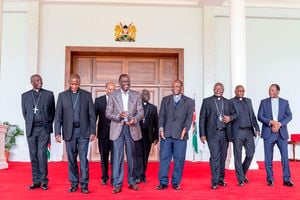We found a way to make co-parenting work, you can too...

Co-parenting.
What you need to know:
- According to Farouk, it was tough at the beginning because his wife resented him.
- All manner of meetings meant to iron out things and chart a new path were not fruitful.
- Farouk is thankful that he managed to recollect himself after the psychological counselling.
Co-parenting is not for the faint-hearted. It’s an unpalatable term to most people, yet sometimes this is the only option on the table, and ex-couples are forced to re-adjust their lives to accommodate the new reality. It can be messy and painful, but they have to do it.
Maureen Nyambura and Farouk Mohamed found themselves in such a predicament. After five years of dating and blissful seven-year marriage, the couple broke up because of irreconcilable differences in 2014.
The spanner in the works was their two children, as they needed to find an amicable way forward for their now 11-year-old daughter, Maha, and seven-year-old son, Malik. Their marriage had crumbled, pushing them into an unfamiliar territory associated mainly with two bitter individuals baying for each other’s blood.
Tough in the beginning
According to Farouk, it was tough at the beginning because his wife resented him. Time and again, they got into unnecessary arguments and disagreements, especially on issues concerning the children. Decisions they had arrived at quickly in the past became starting points of disputes, and all initial plans for their son and daughter ground to a halt.
“I was unable to provide for the children because I couldn’t think straight,” says Farouk.
All manner of meetings meant to iron out things and chart a new path were not fruitful, which severed their relationship even further. As a last-ditch effort, Farouk offered to stay away from them and only send financial support, a proposal that Maureen rejected.
“I refused his support because he would go clubbing every weekend and spend heavily, but was offering very little towards the children,” explains Maureen.
She also denied him access to the children and he only started seeing them again in 2016, two years after they had gone their separate ways.
Losing the marriage was one thing, but losing access to his children was a double tragedy. Farouk was devastated. He had always aspired to be the best dad to his children in terms of being there full time, knowing what they are doing, and seeing them through their milestones. Now, he had lost grip of all that, and Maureen was not making things any easier for him.
“It affected my productivity, leading to depression and eventual hospitalisation for the same,” he says.
A wake-up call
Maureen reiterates that Farouk’s hospitalisation was a wake-up call to both of them, as her ex-husband not only underwent counselling but also requested she attends the same. It is here that he promised to change, and Maureen slowly started allowing him to visit the children or spend time with them at his house.
“I figured that the children needed to know their biological dad well, especially given his willingness to be part of their lives. However, I did not force things. It takes God, time, maturity, as well as forgiveness on both sides to have a meaningful co-parenting agreement,” she says.
Farouk is currently in Uganda due to the border closure occasioned by the Covid-19 pandemic. Although he has not spent time with the children lately, he is still upbeat.
“Initially, I could not see the children or talk to them as much as I wanted, but with time the situation improved, and it continues to improve. They are now able to come and stay with me for a couple of days, and when I am out of the country, we talk on a video call. I look forward to seeing them when the borders open.”
“Co-parenting was the best decision we ever made because our children are extremely confident, knowing both mommy and daddy love them so much despite being apart. He’s their friend and a good disciplinarian. Our daughter is freer with him than me,” admits Maureen.
She pegs the successful arrangement on love for their children, respect for each other, maturity, and friendship that outlasted the romance.
Her sentiments are echoed by Fredrick Osolo, a counselling psychologist at the Kenya Institute of Business and Counselling. He underpins that the biggest stumbling block to joint custody is a narcissistic attitude. In such a case, one parent over-possess the child to the extent of fearing the other party will abuse them emotionally or physically.
There exist cases of one partner trying to inculcate hate or low opinion against the other party in the minds of the babies every time they visit. This has a progressive degradation effect on the children who should ideally enjoy and appreciate affection from both parents without having doubts over the allegiance of one.
Maureen is single but intimates that she never hides the fact that her ex-husband is still part of the children’s lives, and that they still are friends. Farouk, on the other hand, has a new partner in his life and he is glad she is handling the situation pretty well. He indicates that the children were a bit apprehensive about seeing him with a woman who was not their mother, but they eventually accepted her.
“Her initial worries were whether she would meet the expectations of my ex-wife, and the fear that my children would not accept her,” he explains.
Regrets not putting his children first
Farouk’s biggest regret is how he handled things the first few months, as he should have taken full responsibility for his children and provided the much he could afford. He reiterates that whatever happened was between him and their mom. Therefore, it was wrong to bring their differences and shortcomings in between the children. His decisions cost him the valuable time he should have been spending with his children.
“From a man’s point of view, the ego plays a major role in making co-parenting difficult for many. I have since learnt that both parties should resist maintaining strong unrealistic demands and unchangeable opinions because they collapse any good intentions towards co-parenting,” he adds.
Farouk is thankful that he managed to recollect himself after the psychological counselling, accept the loss of his marriage, and let go of all the anger he once harboured against Maureen. This, he says, was achieved when he shifted attention away from the broken marriage. He channelled his energies into striving to see that his children grow up in a peaceful and loving environment where they know despite the circumstances at hand, they are loved, protected and provided for in the best possible way.
Fredrick mentions discipline as another aspect that could easily make or break co-parenting, especially where one party believes in smacking, but the other does not. He explains that boys and girls tend to have different understandings of morality, which calls for the two parents to create a formula that guides reward and punishment, as disagreeing before the children confuse them on what is right and wrong.
“If the child comes back from staying with the other party and says he or she was punished, promise to look into it and follow up when he or she is not listening, but desist from sending double binding messages.”
Whereas Fredrick emphasises the need for co-parents to have some form of a legal document when entering into this arrangement, he is quick to point out that the law is a double-edged sword.
On the positive side, it serves as an assurance of responsibility from the other party because court orders are binding. On the contrary, the same breeds hypervigilance as one party feels forced, now that the process is usually initiated by the other partner.
Farouk cautions that couples should learn to sieve what is useful and important when seeking advice from friends and family. Maureen has learnt that there is more to co-parenting than just finances.
“We do not even have any terms in the area of financial provision. He helps out voluntarily, or when I am financially low, I ask him to help.”





